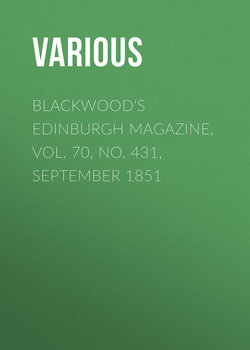Читать книгу Blackwood's Edinburgh Magazine, Vol. 70, No. 431, September 1851 - Various - Страница 6
MY NOVEL; OR, VARIETIES IN ENGLISH LIFE
CHAPTER V
ОглавлениеLeonard and Mr Burley walked on into the suburbs round the north road from London, and Mr Burley offered to find literary employment for Leonard – an offer eagerly accepted.
Then they went into a public house by the wayside. Burley demanded a private room, called for pen, ink, and paper; and, placing these implements before Leonard, said, "Write what you please in prose, five sheets of letter paper, twenty-two lines to a page – neither more nor less."
"I cannot write so."
"Tut, 'tis for bread."
The boy's face crimsoned.
"I must forget that," said he.
"There is an arbour in the garden under a weeping ash," returned Burley. "Go there, and fancy yourself in Arcadia."
Leonard was too pleased to obey. He found out the little arbour at one end of a deserted bowling-green. All was still – the hedgerow shut out the sight of the inn. The sun lay warm on the grass, and glinted pleasantly through the leaves of the ash. And Leonard there wrote the first essay from his hand as Author by profession. What was it that he wrote? His dreamy impressions of London? an anathema on its streets, and its hearts of stone? murmurs against poverty? dark elegies on fate?
Oh, no! little knowest thou true genius, if thou askest such questions, or thinkest that there, under the weeping ash, the taskwork for bread was remembered; or that the sunbeam glinted but over the practical world, which, vulgar and sordid, lay around. Leonard wrote a fairy tale – one of the loveliest you can conceive, with a delicate touch of playful humour – in a style all flowered over with happy fancies. He smiled as he wrote the last word – he was happy. In rather more than an hour Mr Burley came to him, and found him with that smile on his lips.
Mr Burley had a glass of brandy and water in his hand; it was his third. He too smiled – he too looked happy. He read the paper aloud, and well. He was very complimentary. "You will do!" said he, clapping Leonard on the back. "Perhaps some day you will catch my one-eyed perch." Then he folded up the MS., scribbled off a note, put the whole in one envelope – and they returned to London.
Mr Burley disappeared within a dingy office near Fleet Street, on which was inscribed – "Office of the Beehive," and soon came forth with a golden sovereign in his hand – Leonard's first-fruits. Leonard thought Peru lay before him. He accompanied Mr Burley to that gentleman's lodging in Maida Hill. The walk had been very long; Leonard was not fatigued. He listened with a livelier attention than before to Burley's talk. And when they reached the apartments of the latter, and Mr Burley sent to the cookshop, and their joint supper was taken out of the golden sovereign, Leonard felt proud, and for the first time for weeks he laughed the heart's laugh. The two writers grew more and more intimate and cordial. And there was a vast deal in Burley by which any young man might be made the wiser. There was no apparent evidence of poverty in the apartments – clean, new, well furnished; but all things in the most horrible litter – all speaking of the huge literary sloven.
For several days Leonard almost lived in those rooms. He wrote continuously – save when Burley's conversation fascinated him into idleness. Nay, it was not idleness – his knowledge grew larger as he listened; but the cynicism of the talker began slowly to work its way. That cynicism in which there was no faith, no hope, no vivifying breath from Glory – from Religion. The cynicism of the Epicurean, more degraded in his stye than ever was Diogenes in his tub; and yet presented with such ease and such eloquence – with such art and such mirth – so adorned with illustration and anecdote, so unconscious of debasement.
Strange and dread philosophy – that made it a maxim to squander the gifts of mind on the mere care for matter, and fit the soul to live but as from day to day, with its scornful cry, "A fig for immortality and laurels!" An author for bread! Oh, miserable calling! was there something grand and holy, after all, even in Chatterton's despair!
